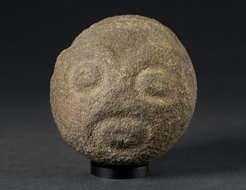|
||||||||||||||||||||||||||||||||
|
|
Museum of: Berlin | |||||||||||||||||||||||||||||||
| Name of the artefact: Human depiction | ||||||||||||||||||||||||||||||||
|
The sculpture is of oval-cylindrical shape. |
||||||||||||||||||||||||||||||||
|
WHERE IS IT AND MAIN
CHARACTERISTICS |
STATE |
|||||||||||||||||||||||||||||||
|
Department: |
Museum for Pre- and Early
History |
Preservation: |
Very good | |||||||||||||||||||||||||||||
|
Inventory number: |
IVa 2033 |
Restauration: |
No restored | |||||||||||||||||||||||||||||
|
Name of the artefact: |
Human depiction |
Completeness: |
Complete | |||||||||||||||||||||||||||||
|
Object type: |
Human figurine |
|||||||||||||||||||||||||||||||
|
Material: |
Stone, volcanic |
|||||||||||||||||||||||||||||||
|
Methof of manufacture: |
Engraving |
|||||||||||||||||||||||||||||||
|
Decoration
type: |
Incision |
|||||||||||||||||||||||||||||||
|
Distinctive mark: |
Depiction of a face |
|||||||||||||||||||||||||||||||
|
DIMENSIONS |
PERIOD OF USE |
|||||||||||||||||||||||||||||||
|
Length (mm): |
- |
Epoque: |
Neolithic |
|||||||||||||||||||||||||||||
|
Heigth
(mm): |
77 |
Culture: |
Lepenski Vir culture |
|||||||||||||||||||||||||||||
|
Diameter
(mm): |
- |
Period: |
Early Neolithic |
|||||||||||||||||||||||||||||
|
Width (mm): |
74 |
Face: |
- |
|||||||||||||||||||||||||||||
|
Thickness (mm): |
53 |
Absolute chronology: |
7th mil. BC |
|||||||||||||||||||||||||||||
|
Weight
(g): |
556 |
|||||||||||||||||||||||||||||||
DISCOVERY |
||||||||||||||||||||||||||||||||
|
Date: |
Maybe at the end of the 19th
century |
Country: |
Serbia |
|||||||||||||||||||||||||||||
|
District: |
- |
Town hall affiliation: |
- |
|||||||||||||||||||||||||||||
|
Village: |
- |
Discovery findspot: |
Lepenski Vir, not certain? |
|||||||||||||||||||||||||||||
|
Condition of discovery: |
Unknown |
Discovery type: |
Other |
|||||||||||||||||||||||||||||
|
ANALYSES – DETERMINATIONS |
FILLED IN BY |
|||||||||||||||||||||||||||||||
|
Type: |
Analysis of traces of use |
Name: |
Dr. Manfred Nawroth |
|||||||||||||||||||||||||||||
|
Laboratory: |
Rathgenlabor, Berlin |
Institution: |
Museum for Pre- and Early
History |
|||||||||||||||||||||||||||||
|
No./Code: |
- |
Date: |
11/11/2005 |
|||||||||||||||||||||||||||||
|
DEEPENINGS |
||||||||||||||||||||||||||||||||
|
Morphology of the object: |
||||||||||||||||||||||||||||||||
|
The sculpture is of oval-cylindrical shape. Traces on
the side below make it probably that the object was used for rubbing. The
upper and lateral sides are picked. On the upper side can be seen the
depiction of a face. |
||||||||||||||||||||||||||||||||
|
Decoration: |
||||||||||||||||||||||||||||||||
|
The depiction of a face with forehead, eyes and brows
and an elliptical mouth is picked into the stone. The space between the
eyes can be interpreted as a nose. A diadem is depicted between forehead
and parting. Traces of brownish and reddish colour seem to make it clear
that the item was originally painted. |
||||||||||||||||||||||||||||||||
|
Inscription: |
||||||||||||||||||||||||||||||||
|
- |
||||||||||||||||||||||||||||||||
|
Analogies: |
||||||||||||||||||||||||||||||||
|
Because of the details of the head the object can be
compared with the statues of the settlement of Lepenski Vir, excavated
near the Iron Age in Serbia in the 1960s. These sculptures were used as
altars. Because of the uncertain circumstances there have to be some
doubts on the origin of the rubber-stone. |
||||||||||||||||||||||||||||||||
|
Interpretation: |
||||||||||||||||||||||||||||||||
|
The small rubber-stone could have a cultic-magic
meaning comparable to the altars of Lepenski Vir. |
||||||||||||||||||||||||||||||||
|
Bibliography: |
||||||||||||||||||||||||||||||||
|
- |
||||||||||||||||||||||||||||||||

